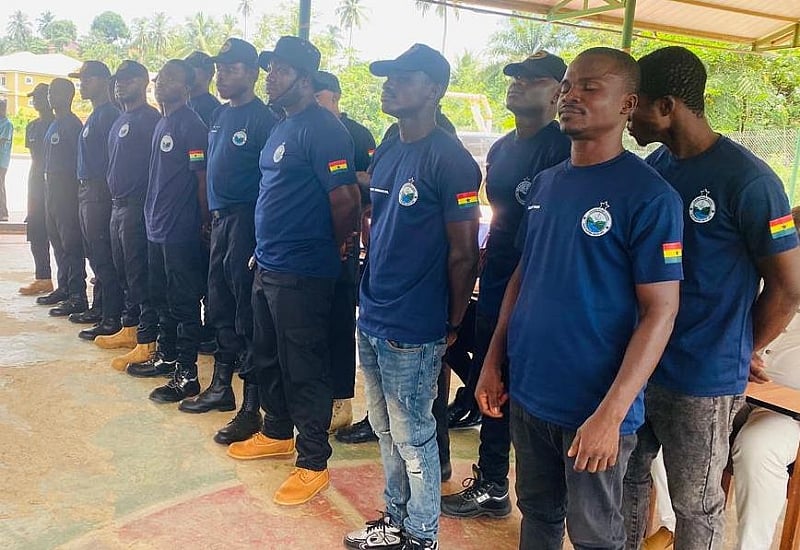The Ghanaian government has initiated a new strategy in its ongoing battle against illegal mining, deploying a specialized unit known as the Blue Water Guards to protect the nation’s vital water resources. This initiative, part of a broader effort to mitigate the devastating environmental consequences of illegal mining, focuses on safeguarding water bodies from pollution and degradation. The deployment began with 20 guards assigned to the Prestea Huni-Valley Municipality, a region particularly affected by illegal mining activities. This deployment marks the initial phase of a larger national program, with 453 guards already trained and a projected 2,000 personnel to be deployed nationwide after completing a rigorous training program at the Ghana Naval Base in Sekondi. The program underscores the government’s commitment to a multi-faceted approach, recognizing that success requires collaboration between various stakeholders, including government agencies, local communities, and the mining industry itself.
The introduction of the Blue Water Guards signifies a shift towards a more proactive and targeted approach to combating illegal mining. Rather than solely relying on reactive measures, the guards are tasked with actively monitoring water bodies, identifying illegal mining operations, and reporting infractions to the appropriate authorities. This proactive strategy aims to prevent environmental damage before it occurs, preserving the integrity of water resources for future generations. The guards’ responsibilities also include advising miners on sustainable and environmentally responsible mining practices, promoting a shift towards a more regulated and sustainable mining sector. This educational component is crucial for fostering a culture of compliance and encouraging miners to operate within the legal framework.
The deployment of the Blue Water Guards has been met with a combination of support and apprehension within the affected communities. While many recognize the importance of protecting water resources, concerns have been raised about the potential impact on the livelihoods of those involved in small-scale mining. Government officials have emphasized that the initiative is not intended to stifle the mining industry but rather to promote responsible and sustainable practices. They have encouraged unregistered miners to formalize their operations, assuring them of support and guidance in navigating the regulatory process. This reassurance is crucial for building trust and ensuring the cooperation of local communities in the fight against illegal mining.
The success of the Blue Water Guards program hinges on effective collaboration between various stakeholders. Government agencies, local communities, traditional leaders, and the mining industry must work together to achieve the common goal of environmental protection. This collaborative approach recognizes that combating illegal mining requires a united front, drawing on the strengths and resources of all involved parties. The program emphasizes the importance of community engagement, ensuring that local voices are heard and that the initiative aligns with the needs and priorities of the communities it serves.
To ensure the integrity and effectiveness of the Blue Water Guards program, strict measures are being implemented to prevent corruption and abuse of power. The guards have been explicitly warned against extorting money from miners, and their operations will be closely monitored by local authorities. This oversight is essential for maintaining public trust and ensuring that the guards operate within the bounds of the law. Furthermore, the government is exploring avenues for providing the guards with additional legal income sources to reduce the temptation of engaging in corrupt practices. This proactive approach demonstrates the government’s commitment to transparency and accountability in its fight against illegal mining.
The deployment of the Blue Water Guards represents a significant step forward in Ghana’s efforts to combat illegal mining and protect its precious water resources. This initiative underscores the government’s recognition that environmental protection is not solely the responsibility of government agencies but requires a collective effort from all stakeholders. By fostering collaboration, promoting sustainable practices, and ensuring accountability, the Blue Water Guards program has the potential to create a more sustainable and environmentally responsible mining sector in Ghana. The program’s success will depend on continued engagement with local communities, ongoing monitoring and evaluation, and a commitment to adapting the strategy as needed to address evolving challenges. The long-term goal is to create a mining industry that contributes to economic development while safeguarding the environment and the well-being of communities.


